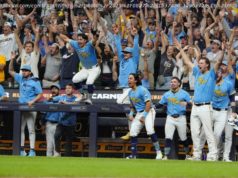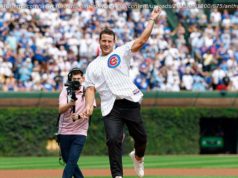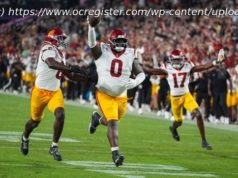As the NFL season begins, the sport’s biggest star is nowhere near the pitch.
But on August 26, after a game against the Green Bay Packers, a reporter looked closer at a picture of the 49ers and noticed Kaepernick sitting alone near the coolers as everyone else around him stood while the anthem played.
Questions were asked. Word spread. Kaepernick became the most talked about athlete in America. A villain to some, a hero to others.
«I am not going to stand up to show pride in a flag for a country that oppresses black people and people of color,» Kaepernick, then 28, told NFL.com’s Steve Wyche, the man who broke the story.
«To me, this is bigger than football, and it would be selfish on my part to look the other way.
«There are bodies in the street and people getting paid leave and getting away with murder.»
Rising against injustice
This was a star quarterback in America’s most popular sports league. A black man with a black biological father and a white biological mother, adopted by white parents who raised him in the predominantly white northern Californian town of Turlock, drawing attention to police brutality.
It was not, he would reiterate, a protest against the military or the flag, though that message would become lost over the next two years, drowned out by the ire and the applause.
A tiny ripple quickly built into a wave which aimed to sweep down the walls of oppression. From San Francisco to Seattle, from the NFL to the National Women’s Soccer League, from elite sports stars to college kids, there were many who wanted to strike out with Kaepernick against injustice.
For the 49ers’ fourth preseason match Kaepernick took to one knee during the anthem; his teammate Eric Reid joined him.
On the same night Seattle Seahawks’ Jeremy Lane sat for the anthem. Days later Megan Rapinoe was the first white athlete to take the knee, doing so before a professional soccer match, and on September 9 Denver Broncos’ Brandon Marshall became the first NFL player to do it in a regular-season game.
Critics emboldened, supporters inspired
Two years on, Kaepernick is unemployed after opting out of his contract in March 2017 before the 49ers could release him and has largely maintained a public silence over the last 12 months. But he is more powerful than he has ever been.
As the new NFL season begins, and the ruling over anthem protests remains unclear, the country’s most influential American footballer, the symbol of a movement, isn’t anywhere near the pitch.
But he returned to the spotlight this week when it was revealed Kaepernick, a Nike athlete since 2011 but not featured in its campaigns since his departure from the NFL, would be the poster boy for company’s 30th anniversary Just Do It ad.
With a black and white picture of the kneeling quarterback-turned-activist superimposed with the nine words, «Believe in something. Even if it means sacrificing everything,» Kaepernick has returned to the forefront of public debate. He didn’t have to say a word, or make a single play.
Over these last few days his supporters have been inspired, his critics emboldened.
Nike trainers and socks have been burnt, the hashtag #boycottnike was trending on Twitter through much of Tuesday. US President Donald Trump, who last year described the NFL protesters as «sons of bitches» and whose frequent comments on the issue has fueled the flames of national debate, said Nike’s ad sent a «terrible message.»
Kaepernick and Reid, who like his former teammate remains unsigned, received ovations at the US Open last week when they were shown on the big screen. Former CIA director John Brennan lauded the former 49er, and by using Kaepernick Nike — a multibillion-dollar company whose interest lies in selling sportswear — has made it clear whose side it is on. They are not with the President on this.
Whether the majority of the NFL’s white, conservative billionaire owners like it or not, Kaepernick is the face of the league which the player himself believes blacklisted him.
A global icon
The man who would spend his time as a player quietly attending lectures at the University of California, Berkeley, to learn about black history is a cultural star, fast turning into a global icon.
«He’s monumentally more famous than he ever was as a player,» Nate Boyer, a former American footballer and Green Beret, tells CNN Sport.
«He’s probably one of the biggest pop culture icon at least out of sport that there is and it’s all due to the demonstrations, it’s nothing to do with football really.»
Boyer has been closely associated with the protest since the beginning, writing an open letter to Kaepernick that was published in the Army Times, which culminated in a face-to-face discussion between the two men. During that meeting, Kaepernick was persuaded by Boyer to kneel for the national anthem rather that sit as it showed, in Kaepernick’s words, «more respect for the men and women that fight for this country.»
Boyer admits he did not think the issue would become as big as it has, but urges Americans «to be smarter» and calls for the man who is now known for a simple, silent gesture to be more vocal.
«To really believe that half of our country is stupid and your side has all the answers and the other half doesn’t have a clue is ignorant,» he says, answering one of hundreds of questions he has been asked on Kaepernick this week, though the pair have not spoken for a while.
«I want to get back to unity in this country. I think Colin can be a big part of bringing us together, but it’s going to take him being vocal, being involved with people on both sides of an issue and reaching across.
«I know Colin can do that because he did it with me, so he’s capable of that. More Americans need to see that because we don’t see it, we just see reactions to one side of the story. I would continue to encourage him to be part of that.»
‘The Muhammad Ali of his generation’
Around the time Kaepernick met Boyer, the player was as much a part of the public discourse as the Presidential election, making headlines with his words and actions.
He received death threats, his teammates voted him the winner of the Len Eshmont award «for inspirational and courageous play,» Time magazine put him on the cover kneeling next to the words «The Perilous Fight,» and earlier this year Amnesty International honored Kaepernick with its ambassador of conscience award.
Described as «the Muhammad Ali of this generation» by civil rights activist Harry Edwards, Kaepernick promised to donate $1 million of his salary to various organizations and continued to speak out, saying that «cops are being given paid leave for killing people. That’s not right. That’s not right by anyone’s standards.»
But, aside from social media posts, the former 49er has been quiet since the end of 2016. He has not spoken to the media since he filed his grievance against the NFL, accusing the league’s owners of conspiring to keep him out because of his protests.
The NFL has attempted to have the case thrown out, but last month the arbitrator determined that Kaepernick’s lawyers had unearthed enough credible evidence to allow the case to proceed to a full hearing. It will no doubt keep Kaepernick in the news during the NFL season.
There are no shades of gray when it comes to Kaepernick. Everyone has an opinion. Even Mahmoud Ahmadinejad, former President of Iran, tweeted this week: «… unfortunately once again @Kaepernick7 is not on a NFL roster. Even though he is one of the best quarterbacks in the league.»
Though his form dipped since his starring role against the New England Patriots in 2012 which led the 49ers to the playoffs and, ultimately, the SuperBowl, statistics suggests Kaepernick is still good enough for the NFL. He threw 16 touchdowns and four interceptions in 2016, while in that November he had the best first-half performance by a 49ers quarterback since Steve Young in 1997.






